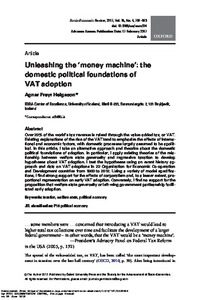Unleashing the ‘money machine': the domestic political foundations of VAT adoption

2017
15
4
Oct.
797-813
taxation ; value added ; welfare state ; economic policy
Public finance and taxation
https://doi.org/10.1093/ser/mwx004
English
Bibliogr.
"Over 20% of the world's tax revenue is raised through the value-added tax, or VAT. Existing explanations of the rise of the VAT tend to emphasize the effects of international and economic factors, with domestic processes largely assumed to be apolitical. In this article, I take an alternative approach and theorize about the domestic political foundations of adoption. In particular, I apply existing theories of the relationship between welfare state generosity and regressive taxation to develop hypotheses about VAT adoption. I test the hypotheses using an event history approach and data on VAT adoptions in 22 Organization for Economic Co-operation and Development countries from 1960 to 2012. Using a variety of model specifications, I find strong support for the effects of corporatism and, to a lesser extent, proportional representation on early VAT adoption. Conversely, I find no support for the proposition that welfare state generosity or left-wing government partisanship facilitated early adoption."
Digital
The ETUI is co-funded by the European Union. Views and opinions expressed are however those of the author(s) only and do not necessarily reflect those of the European Union or the ETUI.